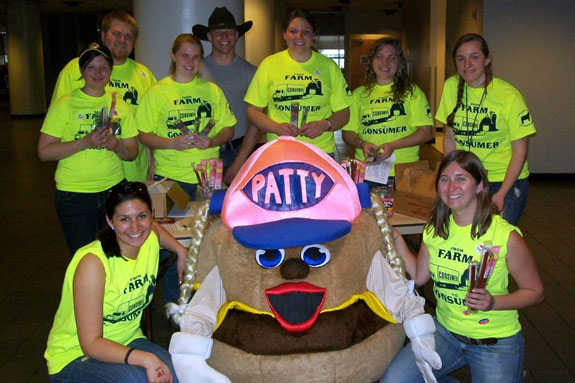Editor's note: The following article is the third in a series of a monthly columns for the Progressive Dairyman Extra e-newsletter. This update is provided by Animal Agriculture Alliance Communications Director Sarah Hubbart. To submit a question or comment for Hubbart, leave a comment below or click here to email the PD Web Editor Emily Caldwell. Q: My local school recently began a "Meatless Monday" campaign. What is your advice for addressing this situation? Even though 97 percent of Americans enjoy meat, milk and eggs as part of their diet, the so-called “Meatless Monday” campaign has been receiving quite a bit of media attention. This is due in part to the high-profile names who have signed on to support it.
Paul McCartney just released a new meat-free cookbook and even meat-lover Mario Batali has promoted it in his restaurants.
During World Wars I and II, the U.S. government encouraged Americans to help the war effort by rationing key food staples. Today’s Meatless Monday campaign attempts to associate itself with this patriotic duty, but it is not a governmental effort. This carefully orchestrated campaign seeks to eliminate meat from our menus seven days a week - starting with Mondays. It’s really about limiting consumer choice.
The campaign uses cartoon animals to target youth with an unfair message that “meat is bad.” Their website blames meat for all matter of ills - from ruining the environment to single-handedly causing America’s obesity epidemic. They provide toolkits to help students from kindergarten through college pressure their school administrators to go meat-free.
New York benefactor, and well-known radical activist, Helaine Lerner is the primary funder of the current Meatless Monday campaign, organized through the Center for a Livable Future (CLF) at Johns Hopkins University’s Bloomberg School of Public Health. Between 2000 and 2003, she also gave more than $7 million to the GRACE (Global Resource Action Center for the Environment) Project, an activist organization focused on eliminating both large scale animal agriculture and nuclear weapons.
CLF is formally affiliated with GRACE through the Henry Spira/GRACE Project on Industrial Animal Production. (Namesake Henry Spira is considered one of the founders of the modern animal rights movement.) You may of heard of GRACE before – they partnered with PETA and another vegan activist group called Farm Sanctuary in 2003 to launch a video smear campaign called The Meatrix, an animated Matrix spin-off that attempted to indoctrinate children with false claims against farmers and ranchers.
But enough about that – now that you have heard some of the history of the new “Meatless Monday,” what should you do if it comes to a school near you?
If you are a parent:
Contrary to what campaign organizers promote on their website, the majority of schools listed as “participating” in the Meatless Monday campaign do not eliminate meat from the menu but offer additional meat-free options in addition to the regular offerings. (The same goes for the many restaurants who have signed on – it is more of a marketing effort on their part than a decision to eliminate meat from their menus.)
Still, the campaign promotes several unfair myths about animal agriculture and the role of meat in the diet that should be addressed. If your child brings home materials promoting the campaign, it would be wise to get in touch with school staff to ensure that your side of the story is heard.
Collaborate with your local parent organizations, extension agents and other community leaders to ensure that they are aware of the issue. Remember – Meatless Monday really isn’t about promoting a healthy diet, it’s a biased, and carefully orchestrated, attack against meat, milk and eggs.
This is especially crucial because life habits are formed early on in life. Most of those children weren't raised on a farm and probably haven't experienced agriculture first hand. These types of outreach programs by activists hope to capitalize on this disconnect. Animal rights organizations push for change incrementally, one student at a time.
If you are a college student:
If Meatless Monday comes to your campus, take the opportunity to host a positive effort to debunk some of the campaign’s myths. The average American is now at least three generations removed from the farm and may not understand the important role agriculture plays in our society.
Too often the public hears more from agriculture’s critics rather than the people who are directly connected to it. It is crucial to reach out to consumers – including friends, family and classmates – to clear misconceptions about the agriculture industry.

One of my favorite examples of college ag-vocacy has become an annual event at Penn State. Campus organizations such as Block and Bridle, Collegiate Cattlewomen, Poultry Science Club and the Dairy Science Club collaborate to host “Meat-In Day.”
Student volunteers share the role that meat plays in a balanced diet while handing out literature and free food samples. (After all, the quickest way to a college student’s heart is through food.) The event even features “Patty Melt," a giant hamburger costume worn by a lucky volunteer that helps to attract curious bystanders.
Click here to learn more about the event. Photo above right provided by Penn State Block & Bridle PR Chair Sarah Doyle.
Events such as these are an upbeat, fun way to counter the negativity of extreme activist groups. It is important that those of us involved in agriculture take extra steps to help others understand the hidden agenda of the Meatless Monday campaign. PD

Sarah Hubbart
Communications Director
Animal Agriculture Alliance
(703) 562-1413




